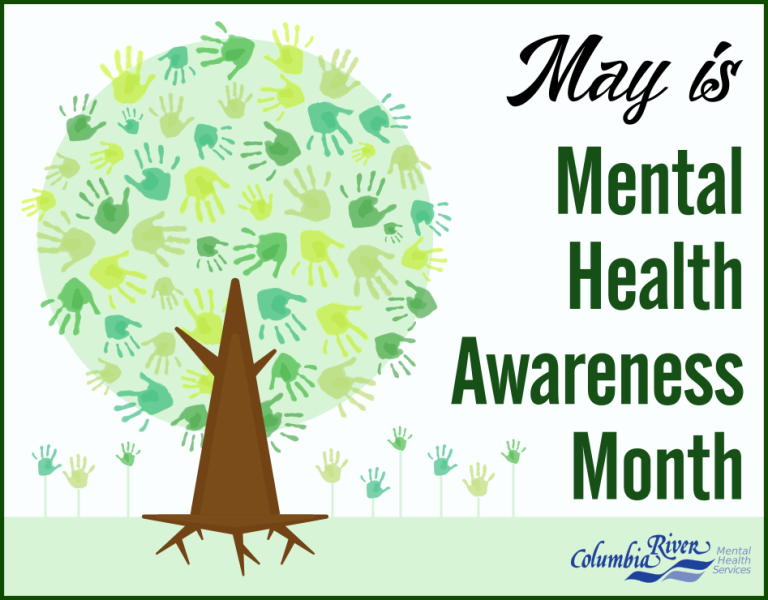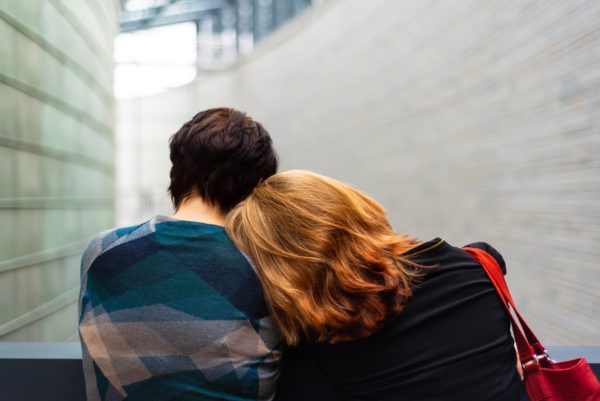My Thoughts On Mental Health Awareness Month

Did you know that May has officially been “Mental Health Awareness Month” in the United States since 1949? Yeah, me either. I find that both terribly sad and wildly exciting. Sad because something so important took 70+ years to gain attention, and exciting because finally, mental health awareness is getting the spotlight and voice it deserves.

Mental health is so critical and so close to my heart that trying to pinpoint the correct words and tone is difficult. So, I’m going to write this article under the lens of being something I wish I could have read when I was 20 years old and thought I was losing my mind.
This is My Story:
The newly coined term “Sunday Scaries” resonates to my core. I remember as a child I would cry, meltdown, even make myself sick because I couldn’t handle the anxiety of going to school on Monday. I’d get so angry with my parents for their lack of understanding and convince myself that it was all their fault, but I would always go and it would always be fine.
I can remember passing notes to my best friend in Junior High and asking her on a daily basis if I was still her best friend. She would get so annoyed by being asked the same question repeatedly, and honestly, I can’t blame her. I recall lying awake at night in my childhood twin size bed with quiet tears streaming down my face as I contemplated my parent’s impending deaths. These are definitely not normal behaviors for a young girl to have, but I didn’t know that.
I had always been a stellar student and the majority of the pressure to succeed was put upon myself by myself. Going to University was no different. I studied hard and excelled, but something happened when I was 20 years old that would forever change the shape of my life. I’m not sure if it was a mental break down or a panic attack, but it was for sure alarming. I skipped class (something I’d never done, ever), was crying inconsolably, felt paralyzed with fear, and called my parents to let them know that I just didn’t think I could finish school.
I was absolutely overwhelmed and totally losing my grip with reality.
The details are hazy now, but I know that I ended up in a doctor’s office. I told her how I felt completely crippled and emotionally out of control, but I couldn’t express why I had these feelings. There was nothing happening to me that was particularly horrible. I was going to school, seeing my friends, living in a sorority house, had a long-term boyfriend – life was good. There was nothing to create this horrible sense of dread.
She then explained to me how NORMAL this was, especially for people my age…Normal…Something I’d never felt farther from, but so calmed by the reassurance. She gave me some stats that I can’t remember now and ultimately told me that I was suffering from Generalized Anxiety Disorder and prescribed me medication.
It changed my life.
Finally, FINALLY, I started to feel relief from emotions and sensations I had never pinpointed because I had no idea I had practically been in a permanent state of Fight or Flight. I was happier, I could handle stress and deadlines with so much more finesse, and I could focus! It was truly a miracle.
Fast-forward about 5 years to when I decided I was cured. I had a very successful career, a beautiful apartment, friends and family who loved me, a new puppy – life was awesome! Clearly (I thought) I had outgrown the need for this “crutch”. I was stronger than a pill! So I took myself off of my miracle medicine (NEVER DO THIS WITHOUT DOCTOR ASSISTANCE). I began to feel “zaps” throughout my body like being momentarily electrocuted, I had blips in my vision, and bouts of dizziness. I chalked this up to being dehydrated or sleep deprived (seriously, Ashley?).
Then one day, a couple of months after I stopped the meds, I found myself in such a depressed state that I couldn’t get out of bed or even shower. I called in sick to work. I stayed inside. And I didn’t tell anyone. My mom discovered me this way and marched me back to the doctor where they put me right back on medication. And what do you know, in a few weeks time I was sorted. I really struggled with the realization that I was incapable of helping myself. Here I am a smart, strong, independent woman that can’t function properly without a pill – how embarrassing, how weak, how devastating. HOW WRONG!

The Stigma:
20 year old me was embarrassed by my new diagnosis. I didn’t tell a single soul besides my parents that I now required a pill to make me feel “normal”. I didn’t talk about anxiety or depression with anyone. The thought that someone else out there – a friend, a classmate, a stranger – could be suffering just like I was didn’t enter my mind. I didn’t understand that my embarrassment and secrecy was a part of a much bigger problem, The Stigma.
To be honest with you, I had to look up the meaning of the word stigma. I thought it meant something like “perception”, but it is so much more than that. Even more shocking is that I’m guilty of its perpetuation, but no more!
Stigma – adj. – 1a strong lack of respect for a person or a group of people or a bad opinion of them because they have done something society does not approve of; 2a mark of disgrace associated with a particular circumstance, quality, or person; 3a mark of shame or discredit
I would say that I’m personally guilty of the third definition, feeling shame. To this day I still struggle with feelings of inadequacy and questioning why I can’t properly function without the help of a medication. But I’m also learning to embrace this part of myself because it’s a huge portion of what makes me, me. Would a person with heart disease or diabetes avoid their medication because they wished they weren’t ill and dependent upon it to live a healthier life? I sure hope not! So why should I?
We are way overdue as a society to finally be embracing the realities of mental health and mental illness, but late is better than never. I absolutely LOVE the fact that the hashtags #breakthestigma and #endthestigma have over a million posts on Instagram. That means that there is a community around mental health awareness, which also means that those suffering will recognize that they’re not the only ones. Just that realization alone can do wonders along the journey to getting help.

The Misconception:
It’s important to denote the significant difference between anxiety and an anxiety disorder. Just because you are feeling anxious does not automatically mean you have an anxiety disorder. Experiencing moments of stress and fear throughout life is expected and unavoidable. It is only when the anxiety becomes excessive, irrational, uncontrollable, overwhelming, and crippling that one should consider seeking help.
Equally, mental illness as a whole (meaning beyond anxiety disorders) is not necessarily someone’s personality. What I mean by this is that if your friend seems “flaky”, they may be struggling with social anxiety. If your brother is “moody”, he may have bipolar disorder. Maybe your boss is “anal” about the office being tidy because they might have obsessive-compulsive disorder. If you notice certain patterns in a person’s behavior it may be worthwhile to start a conversation.
Finally, a mental illness is just as significant as a physical illness. It requires monitoring and treatment. It can flare up or calm down. Mental illness can take years to present itself. It can seriously impact a person’s day-to-day activities. Unfortunately, it can occasionally lead to death. It’s significant, it’s common, and it’s real.
The Reality:
- Approximately 1 in 5 adults in the U.S. (46.6 million) experiences mental illness in a given year.
- Approximately 1 in 25 adults in the U.S. (11.2 million) experiences a serious mental illness in a given year that substantially interferes with or limits one or more major life activities.
- Anxiety disorders are the most common mental health illness in the United States.
- Nearly 40 million people (18.1% of the population) in the United States experience an anxiety disorder in any given year.
- Most people develop symptoms of an anxiety disorder before the age of 21.
- Anxiety disorders are highly treatable, yet only 36.9% (one third) of those suffering receive treatment.
- Anxiety disorders develop from a complex set of risk factors, including genetics, brain chemistry, and life events.
So why should we be ashamed when a huge chunk of the population shares ours or a similar ailment? Why should we hide it? The fact that only 1/3 of people with an anxiety disorder ever seek out treatment makes me want to shout from the rooftops that it’s OKAY TO NOT BE OKAY. Obviously, it goes beyond anxiety disorders. 1 in 5 Americans experience a mental illness and it’s important that they not feel shame or loneliness on top of their illness. End the stigma, talk about it, and go get the help that you need. Don’t suffer in silence.

The Remedy:
While not all mental illnesses are curable, they are typically treatable. Anxiety disorders are extremely treatable and I’d like to offer some suggestions for coping and treatment. I highly recommend researching your specific mental health concern to find the best care for you.
- Therapy – Cognitive Behavioral Therapy can help you develop coping mechanisms to conquer your fears. It’s a perfect complement to medication.
- Medication – As mentioned in my story, medication was practically the cure for me. Since beginning my journey with SSRIs I have found relief in Celexa and now Lexapro. Work with your doctor to find the dosage and brand that’s best for you. If you have a headache would you take an aspirin? Yes. So think of this the same way.
- Talk About It – Don’t be afraid or ashamed to discuss your feelings with friends, family, and medical professionals. They all want to help.
- Pause – When a bout of intense anxiety crashes over you, take a moment to pause. Focus only on the here and now. Focus on your breathing and try to slow it down. Take a moment to meditate if possible.
- Question It – Question your own thoughts. What is the likelihood that this terrible thing you’ve built up in your mind will actually happen? What is the absolute worst thing that can happen? Are the thoughts you’re having really the truth?
- Distract Yourself – Read, write, go for a walk. Change your environment to reroute and unhealthy thought process.
- Journal – Write out your fears, stick a pin in them, and leave them on the page.
- Make a Plan – Figure out the steps you will take to accomplish something overwhelming. Each step forward, no matter how slow, is still moving forward.
- Give Yourself Time – Try to eliminate unnecessary moments of chaos and rushing.
Mental Health Awareness Support:
If you are one of the lucky ones that do not battle an anxiety disorder, you may still have a friend, employee, or loved one who does. It’s important to know how to manage and support someone dealing with anxiety:
- Educate yourself about anxiety disorders.
- Support and encourage the person getting treatment.
- Exercise together.
- Listen.
- Offer advice, but AVOID phrases like, “just relax”, “let it go”, “you’re making a mountain out of a molehill”
- Provide affirmations.
- Invite the person to share what they’re working on personally or in counseling.
- Create a welcoming environment.
- Have an open-door policy to promote a sense of community and open communication.
- Maintain confidentiality, both personally and professionally.
- Set expectations.
Know that it’s not your job to fix them. As a person with chronic anxiety, sometimes I just need to hear the words: “even if it all goes to shit, it’ll be okay”. ☺ Other times I just need to battle it out on the treadmill. But MOST of the time, I’m not able to put my fears into words because I don’t even understand them myself. So please have patience with whomever it is.

The Path Forward
As a little girl, I never knew that there was a name and a reason that I had these bizarre fears. It wasn’t anything we discussed at that time. But now, thanks to the brave crusaders before us and mental health awareness, it is! I am now incredibly vocal about my anxiety disorder. I’ve had healthy conversations about it with my husband, friends, family, and even an incredible boss. Because of my transparency, I’ve had a young adult reach out to me to discuss the fact that she believes she may have anxiety too, and I’ve been able to help her. That makes my heart so full. Just think of the ripple effect your openness could create. Shame, embarrassment, The Stigma, they’re all slowly melting away and it’s beautiful to watch.
Never forget: it’s okay to not be okay, you’re not alone, illness isn’t a weakness, and End the Stigma!








